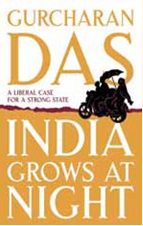By Gurcharan Das
Reviewed by: Lalita Reddi, Research Associate at ISB

Tracing India’s growth trajectory from the pre-Independence era to the present, Das blames India’s lack of progress in the years following independence on Nehruvian socialism. The country’s vast disparities and lack of maturity meant that socialism could not work. Eventually, as India embraced economic reforms, rapid growth followed. However, poor governance and a weakening rule of law meant that the country was beset with problems such as corruption and delayed justice, and Das discusses them in detail in successive chapters.
Perhaps, observes Das, it is time for another big change. He makes the case for a liberal state built on three pillars: “first, the power to act independently and resolutely; second, a rule of law which constrains political power and limits corruption; and third, democracy and accountability which allow the people to change their rulers when they start behaving badly.” The nation needs governance that does not encumber its spirit, but rather complements the positive attributes of the Indian character, and has the swiftness and flexibility to keep pace with the evolving times. With such governance, India could also grow during the day.
For most Indians familiar with the weaknesses in the system, this book does not offer any new insights. Neither does it offer a blueprint for implementing the changes that would lead the country to progress. In all fairness, Das admits candidly that the book is more about unearthing the reasons behind India’s current lack of progress than about providing practical solutions, though he does offer an idealistic formula for growth, which includes the formation of a new liberal political party and the awakening of the middle class. Thus, somewhat dissatisfyingly, the problem, though extensively and thoughtfully explored, remains unsolved. What the country needs now is not just idealistic fervour among its people but also a single-minded passion to translate these ideals into practical solutions.








